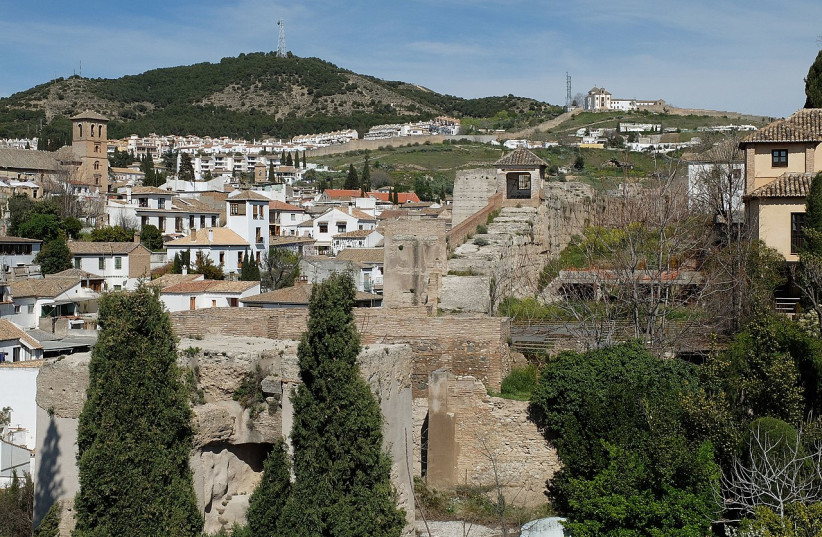December 30 marks 955 years since the Granada massacre, a brutal event when a Muslim mob stormed the royal palace in Granada in Muslim-ruled Spain, crucified the Jewish vizier and slaughtered thousands of Jewish residents of the city.
Granada was the capital of a Berber Muslim kingdom of the same name in modern-day Spain, then known as al-Andalus when it was under Muslim rule. At the time, it was ruled by the Zirid dynasty, and while control of the kingdom would change hands for several centuries, Granada would ultimately be known as the last bastion of Muslim rule in al-Andalus before it fully fell to Spanish rule in 1492 in the culmination of the Reconquista.
But the Jewish presence in Granada is far older. In fact, while some legends even posit that Jews had lived in the city since the destruction of the First Temple, the first known evidence dating back to the year 711. In fact, the Jewish presence in Granada is so old and established that the city is said to have once been known as Garnāta-al-Yahūd, meaning Granada, City of the Jews. Although some scholars cast doubt on this widespread assumption of Jewish history in the city, the traditional legacy lives on, as has its importance in Jewish history.
Like in many parts of al-Andalus, the local Jewish population thrived, with the period of Muslim rule over the Iberian peninsula widely being regarded as the "Golden Age" for Sephardi Jewry. During this era, Jews enjoyed more freedoms and prosperity than they had for over a thousand years, and Jewish culture, philosophy and science thrived.
The situation was not always good, however. In fact, after the fall of the Caliphate of Cordoba and al-Andalus fractured into smaller Muslim kingdoms, Jews did not always have the same prosperity. But this was not the case in Granada, where Jewish life thrived under the rule of the Zirids.

INDEED, the sheer influence the Jewish community had in Granada cannot be understated, as they were not held to the same status of dhimmi – non-Muslims given protected status – that was usually the case under Muslim rule. One scholar even went so far as to describe the Zirid state as "a Jewish kingdom in everything but name."
This can especially be seen in the case of one Jew, in particular: Samuel ibn Naghrillah, better known as Samuel HaNagid or Shmuel HaNagid, a prominent Talmudic scholar, poet and philosopher described by some as the most influential Jew in al-Andalus. He saw massive success throughout his career and even became the Zirid's top vizier and general, the latter being the first time a Jew commanded Muslim armies on the battlefield. Indeed, both positions were contrary to the Pact of Umar, an ancient Muslim treaty that established the dhimmi status and ensured dhimmi couldn't hold public office under Muslim rule.
After his death, his son, Joseph ibn Naghrela, replaced him as vizier. Unfortunately, he would not have the success of his father.
Some described Joseph as being prideful and not humble, others that he lacked faith. While these accusations may not be true, as many other accounts praise him, many Berbers were discontent with him.
This itself is due to many possible reasons, such as resentment that Joseph would hold such a prominent position or that he had supposedly planned to let an enemy kingdom enter the city if they installed him as king.
Also quite well-known is the circulation of poems slandering Joseph and the Jews as a whole. One of these poems, written by Ibrahim ibn Masud ibn Saad al-Tujibi, also known as Abu Ishaq, was especially venomous and contained the following verses, as recounted by historian Bernard Lewis.
Do not consider it a breach of faith to kill them, the breach of faith would be to let them carry on.
They have violated our covenant with them, so how can you be held guilty against the violators?
How can they have any pact when we are obscure and they are prominent?
Now we are humble, beside them, as if we were wrong and they were right!
What ultimately resulted was the massacre.
ON DECEMBER 30, an angry mob stormed the palace and crucified Joseph before turning their rage onto the Jews of the city, slaughtering thousands of them.
The exact death toll is unclear and hotly debated. While many have attributed the number to be in the thousands, specifically around 1,500 households, the exact number is unknown. Regardless, the bloodshed is well documented and is widely considered to be an example of an antisemitic pogrom.
Not all the Jews were killed, but many others were forced to flee, selling their homes and lands to leave Granada.
The Jews would return to the city later on. However, it would never reach the same peak it once had. Jews were handled differently under the subsequent ruling dynasties of the Almoravids, Almohads and Naserites, some better and some worse. Ultimately, however, the long history of Jewish life in Granada would come to an end in 1492, when the Jews were expelled from Spain.
The massacre is considered by many to mark the end of the Golden Age of Sephardi Jewry in al-Andalus, a prelude to the tragic fates that would befall Jews on the Iberian Peninsula.
To this day, despite having once been the city of the Jews, traces of ancient Jewish life in Granada are almost entirely gone.
